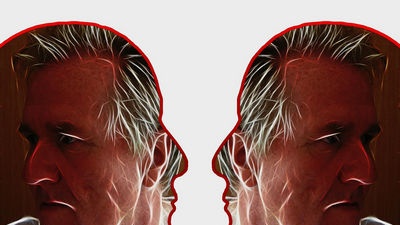|
 Among other mental processes, memory has a great "pedagogical significance". Among other mental processes, memory has a great "pedagogical significance".
Let us listen to the conversation that teachers sometimes lead between themselves, and we often hear: “Zina Voevodina has a bad memory, she herself says that even five repetitions is not enough for her to memorize a paragraph on physics”, or “Misha has an excellent memory, he doesn't even need to learn his lessons, everything just fits in by itself, "or" It's strange, we had a repetition yesterday, I call Ustinov, he doesn't remember, he can't really say a word, but he answered the same material two weeks ago and got an A. Meanwhile, in all this - in the individual and age characteristics of memory, in the speed of forgetting and the difficulties of remembering - there is nothing surprising and strange.
Memory is subject to objective laws, and both the teacher and the first students need to know these laws in order to properly organize the process of understanding the educational material, teach them to repeat and reproduce. The second is to consciously approach the important task of self-education of the individual, where the ability to correctly and effectively manage the capabilities of one's memory plays a significant role. Schoolchildren often turn to teachers with complaints of poor memory and expect help and advice from them, and sometimes they desperately need to be encouraged, reassured, made to believe in the reliability of their memory. It goes without saying that teachers should be well versed in the psychological problems of memory and be competent and tactful in the advice, explanations and recommendations they give students.
A modern person needs to know a lot and remember a lot, and more and more every year. Books and all kinds of records, video and films, computer disks and millions of index cards in libraries come to the rescue of memory. But all these achievements of human genius - from knots on strings, which were once used in order not to forget assignments, to machines that translate from foreign languages - do not depreciate, but set off the magical power that we call memory. All of these are aids that are created with the help of human thought and have meaning and significance only because they are designed to serve their needs.
Like all mental processes, memory is a reflection of objective reality. But if the present is reflected in sensations and perceptions, then memory reflects a person's past experience.
Let's imagine for a moment a person who has completely lost his memory. What would he have lost thereby? Absolutely everything!
 Suppose that memory loss happened to him on the street when he was going to work. To begin with, he would not have come to the goal of his path, and if they had brought him there, he would not have known what to do there. He would forget who he is, what his name is, where he lives. He would have forgotten his native language and could not have said a word. Moreover, he could not make a single movement, he could not take a step, he would not be able to reach out for a glass of water, since the memory for movements would disappear, skills and abilities that were developed from childhood would disappear. The past would no longer exist for him. But the present is just as hopeless for a person deprived of memory, he cannot remember anything, he is not able to learn anything. Suppose that memory loss happened to him on the street when he was going to work. To begin with, he would not have come to the goal of his path, and if they had brought him there, he would not have known what to do there. He would forget who he is, what his name is, where he lives. He would have forgotten his native language and could not have said a word. Moreover, he could not make a single movement, he could not take a step, he would not be able to reach out for a glass of water, since the memory for movements would disappear, skills and abilities that were developed from childhood would disappear. The past would no longer exist for him. But the present is just as hopeless for a person deprived of memory, he cannot remember anything, he is not able to learn anything.
The importance of memory in human life is exceptionally great. Memory connects a person's "past" with his "present", thereby ensuring the unity of the personality. The human body has a constant metabolism.From the nutrients that our body receives from the outside, new cells are built, old ones die off, the obsolete in the body is replaced by those that are being born, but the memory invariably preserves for us what was our yesterday.
Memory is an integral part of all mental processes of a person and requires the use and processing of past experience, enshrined in ideas. But sometimes memory is, as it were, pushed to the fore, and then vivid representations recreate before us a picture of the distant and recent past. So, in the wonderful poem by Alexander Pushkin "I visited again ..." we find an excited description of the memories that flooded the poet.
In the chain of memories that memory unfolds in front of us, it is easy to see a living connection with the feelings, desires and needs of a person. They are the ultimate cause that causes and activates memory processes.
How is the imprinting of past experience carried out, in what its characteristic features are revealed? How do the main processes of memory proceed: memorization, preservation and the opposite process of forgetting, recognition and reproduction? What are the patterns of memory? Where is the reason for some of its amazing mysteries? And, finally, is it possible to improve memory, to make it more flexible, obedient; memorization faster, retention more durable, recognition and reproduction more accurate and readily? How to put knowledge of the patterns of memory in the service of learning?
Petrovsky A.V. - A door open to the past
|
 Among other mental processes, memory has a great "pedagogical significance".
Among other mental processes, memory has a great "pedagogical significance". Suppose that memory loss happened to him on the street when he was going to work. To begin with, he would not have come to the goal of his path, and if they had brought him there, he would not have known what to do there. He would forget who he is, what his name is, where he lives. He would have forgotten his native language and could not have said a word. Moreover, he could not make a single movement, he could not take a step, he would not be able to reach out for a glass of water, since the memory for movements would disappear, skills and abilities that were developed from childhood would disappear. The past would no longer exist for him. But the present is just as hopeless for a person deprived of memory, he cannot remember anything, he is not able to learn anything.
Suppose that memory loss happened to him on the street when he was going to work. To begin with, he would not have come to the goal of his path, and if they had brought him there, he would not have known what to do there. He would forget who he is, what his name is, where he lives. He would have forgotten his native language and could not have said a word. Moreover, he could not make a single movement, he could not take a step, he would not be able to reach out for a glass of water, since the memory for movements would disappear, skills and abilities that were developed from childhood would disappear. The past would no longer exist for him. But the present is just as hopeless for a person deprived of memory, he cannot remember anything, he is not able to learn anything.









